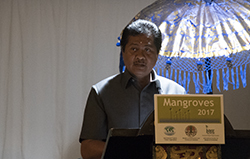Mangroves are key element of Bali tourism, says Vice Governor
19 April 2017

Ketut Sudikerta, Vice Governor of Bali, said that Indonesia needed to strengthen mangrove conservation.
Bali, Indonesia, 18 April 2017: Indonesia needs to strengthen its efforts to conserve mangroves because the richness of flora and fauna in mangrove ecosystems is a key element of Bali’s tourism industry, according to the Vice Governor of Bali Province, Ketut Sudikerta.
Speaking at the opening of the International Conference on Sustainable Mangrove Ecosystems, Mr Sudikerta said that stronger efforts are needed to conserve Indonesia’s mangrove ecosystems. Over 80% of Bali GDP originates from the tourism industry, and mangrove ecosystems are an essential element of the industry.
Mangrove ecosystems worldwide provide many goods and environmental services essential for the livelihoods of coastal peoples, the sustainability of fisheries and coastal tourism, and biodiversity conservation, and they store among the highest densities of carbon of any ecosystem globally. Mangrove ecosystems are under threat, however, with up to 50% of the world’s mangroves lost in the last 40 years.
Dr Hilman Nugroho, Indonesia’s Director General of Watershed Protection, Forests and Environment, said he hoped that the International Conference on Sustainable Mangrove Ecosystems would produce an action plan for moving the international community forward in defending mangrove forests worldwide and in attracting the attention of donors to accelerate efforts to sustainably manage mangrove ecosystems.
Also speaking at the opening of the conference were Professor Sanit Aksornkoae, senator in the Thai Parliament and President of the International Society for Mangrove Ecosystems (ISME); Dr Steven Johnson, Officer-in-Charge of the International Tropical Timber Organization (ITTO); and Dr Manoel Sobral Filho, Director of the United Nations Forum on Forests (UNFF). A wide range of expert speakers on the conference’s opening day informed participants on the status of mangrove management in Africa, Asia and Latin America. The conference, organized jointly by ITTO, the Ministry of Environment and Forestry of Indonesia, and ISME, will build on lessons learned in the protection, restoration and sustainable management and use of mangrove ecosystems to identify ways of maintaining and increasing the contributions of mangrove ecosystems to livelihoods, the global environment and the achievement of the Sustainable Development Goals and the Paris Agreement on climate change. The conference will conclude on Friday 21 April.
More information on the conference is at http://www.itto.int/mangro